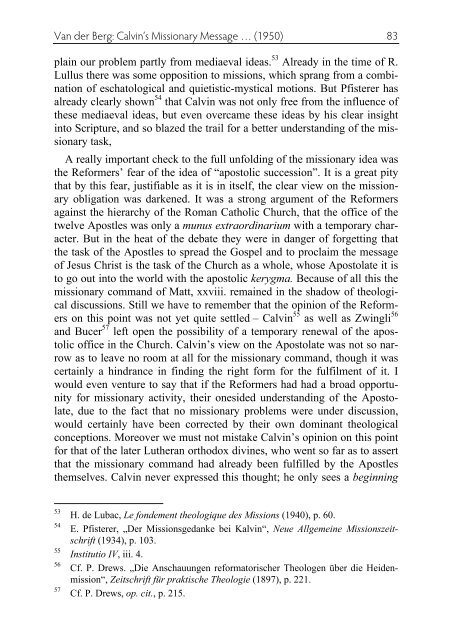Calvin and Missions - World Evangelical Alliance
Calvin and Missions - World Evangelical Alliance
Calvin and Missions - World Evangelical Alliance
Create successful ePaper yourself
Turn your PDF publications into a flip-book with our unique Google optimized e-Paper software.
Van der Berg: <strong>Calvin</strong>’s Missionary Message … (1950) 83<br />
plain our problem partly from mediaeval ideas. 53 Already in the time of R.<br />
Lullus there was some opposition to missions, which sprang from a combination<br />
of eschatological <strong>and</strong> quietistic-mystical motions. But Pfisterer has<br />
already clearly shown 54 that <strong>Calvin</strong> was not only free from the influence of<br />
these mediaeval ideas, but even overcame these ideas by his clear insight<br />
into Scripture, <strong>and</strong> so blazed the trail for a better underst<strong>and</strong>ing of the missionary<br />
task,<br />
A really important check to the full unfolding of the missionary idea was<br />
the Reformers’ fear of the idea of “apostolic succession”. It is a great pity<br />
that by this fear, justifiable as it is in itself, the clear view on the missionary<br />
obligation was darkened. It was a strong argument of the Reformers<br />
against the hierarchy of the Roman Catholic Church, that the office of the<br />
twelve Apostles was only a munus extraordinarium with a temporary character.<br />
But in the heat of the debate they were in danger of forgetting that<br />
the task of the Apostles to spread the Gospel <strong>and</strong> to proclaim the message<br />
of Jesus Christ is the task of the Church as a whole, whose Apostolate it is<br />
to go out into the world with the apostolic kerygma. Because of all this the<br />
missionary comm<strong>and</strong> of Matt, xxviii. remained in the shadow of theological<br />
discussions. Still we have to remember that the opinion of the Reformers<br />
on this point was not yet quite settled – <strong>Calvin</strong> 55 as well as Zwingli 56<br />
<strong>and</strong> Bucer 57 left open the possibility of a temporary renewal of the apostolic<br />
office in the Church. <strong>Calvin</strong>’s view on the Apostolate was not so narrow<br />
as to leave no room at all for the missionary comm<strong>and</strong>, though it was<br />
certainly a hindrance in finding the right form for the fulfilment of it. I<br />
would even venture to say that if the Reformers had had a broad opportunity<br />
for missionary activity, their onesided underst<strong>and</strong>ing of the Apostolate,<br />
due to the fact that no missionary problems were under discussion,<br />
would certainly have been corrected by their own dominant theological<br />
conceptions. Moreover we must not mistake <strong>Calvin</strong>’s opinion on this point<br />
for that of the later Lutheran orthodox divines, who went so far as to assert<br />
that the missionary comm<strong>and</strong> had already been fulfilled by the Apostles<br />
themselves. <strong>Calvin</strong> never expressed this thought; he only sees a beginning<br />
53<br />
H. de Lubac, Le fondement theologique des <strong>Missions</strong> (1940), p. 60.<br />
54<br />
E. Pfisterer, „Der <strong>Missions</strong>gedanke bei Kalvin“, Neue Allgemeine <strong>Missions</strong>zeitschrift<br />
(1934), p. 103.<br />
55<br />
Institutio IV, iii. 4.<br />
56<br />
Cf. P. Drews. „Die Anschauungen reformatorischer Theologen über die Heidenmission“,<br />
Zeitschrift für praktische Theologie (1897), p. 221.<br />
57<br />
Cf. P. Drews, op. cit., p. 215.

















